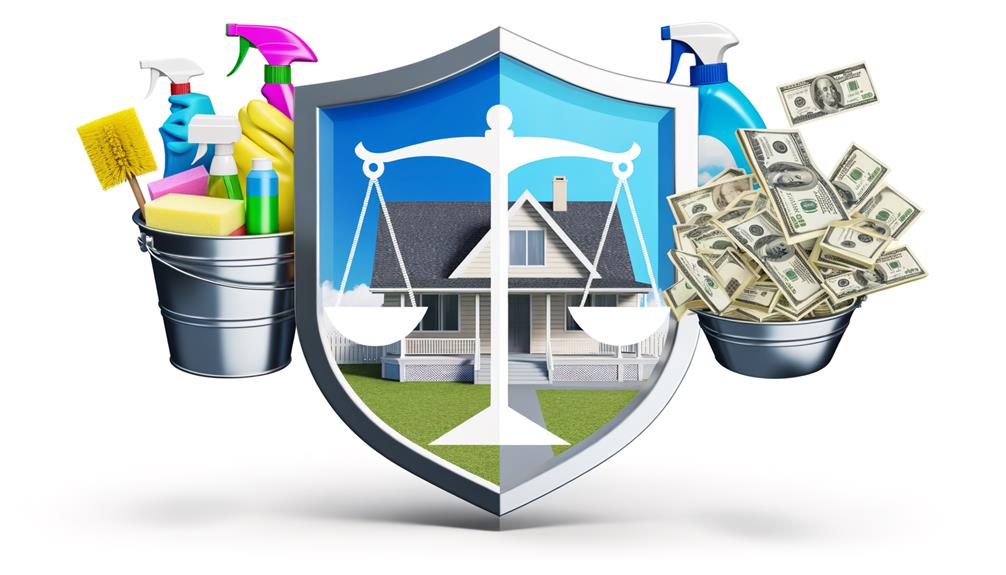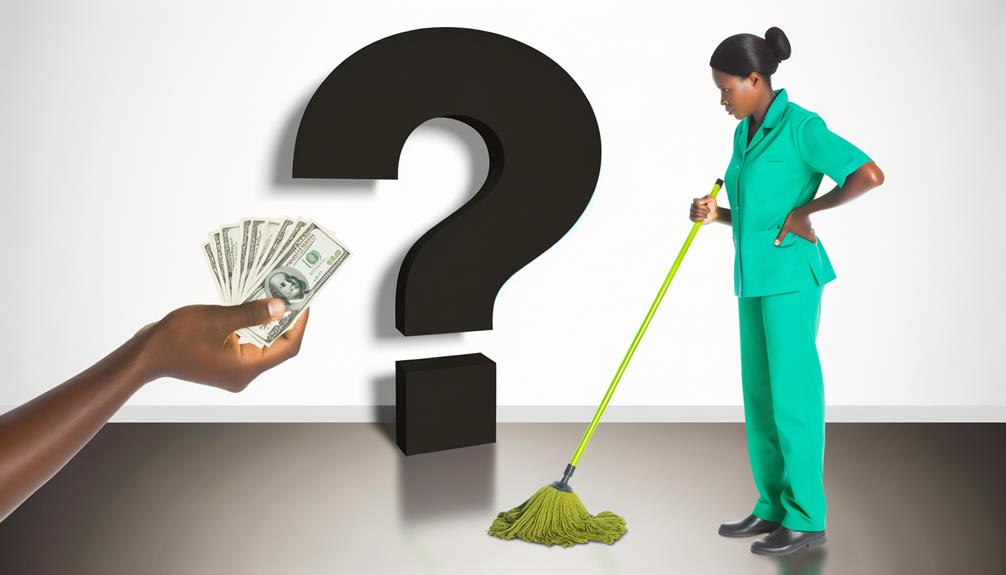In the realm of domestic work, the cash economy often thrives, raising pivotal questions concerning legality and ethical compliance. The practice of cleaning houses for cash, although commonplace, prompts a nuanced discussion around taxation, labor rights, and economic transparency.
Is it legal to accept cash payments for such services while bypassing the formalities of reporting this income to the taxation authorities? The answer is not as straightforward as it may initially appear, inviting us to peel back the layers of this multifaceted issue.
The potential implications for both individuals and businesses are significant, and the consequences of non-compliance can be severe. As we proceed, we will be examining the complex landscape of informal labor contracts, their legality, and the potential repercussions they may entail.
Key Takeaways
- Under-the-table payments in the house cleaning industry are illegal.
- Not reporting cash payments as income is against federal and state tax laws.
- Adhering to tax and employment laws fosters trust in your house cleaning business.
- Formal payment systems enhance the credibility and security of your cleaning business.
Understanding Under-the-table Payments
Under-the-table payments, a term often associated with cash transactions that go unreported, are considered illegal, particularly in the house cleaning industry. These payments refer to money exchanged for cleaning services that are not reported to the tax authorities. While cleaning houses for cash is a legal and common practice, not declaring this cash as income is illegal.
When it comes to income taxes, it is required by law to report your earnings, regardless of how they are received. This rule applies equally to cleaning businesses, their owners, and employees. If only non-cash earnings are declared, while cash earnings are hidden, it is considered a violation of the law.
The legal consequences of such actions can be severe. If the IRS finds discrepancies in your reported income, you can be audited and fined. The penalties for under-the-table payments can include hefty fines, penalties, and even jail time in extreme cases. Therefore, it is not only ethically correct but also legally necessary to report all earnings, cash or otherwise, from cleaning services.
This ensures compliance with the law and safeguards against potential legal repercussions.
Legal Implications of Cash Payments
While cash payments are a prevalent and lawful form of remuneration in the house cleaning industry, there are important legal implications for both individuals and businesses if this income is not correctly reported to tax authorities. Not reporting income from cleaning houses for cash can lead to significant fines and penalties from the Internal Revenue Service (IRS) and the respective state tax agency.
For business owners, it's imperative to pay attention to the following legal implications:
- Federal and State Tax: Failing to report any form of income, including cash payments, is against federal and state tax laws. This could lead to audits, penalties, and potential legal action.
- Individuals: Any income, whether from a regular job or cleaning houses for cash, must be reported to the IRS.
- Businesses: All house cleaning business owners must report their full income, including cash payments, to avoid potential legal and financial troubles.
- Employment Laws: If you employ others in your house cleaning business, not reporting cash payments could lead to violations of labor laws and worker compensation regulations.
Understanding and adhering to these laws will help avoid unnecessary legal complications and foster trust in your house cleaning business.
Making Your Cleaning Business Legal

In order to ensure the legality and integrity of your house cleaning business, it is essential to properly manage cash payments and adhere to all tax and employment laws. As a cleaning business owner who cleans houses for cash, you have both legal and financial obligations that must be met to avoid legal issues and penalties.
Firstly, you must report your income accurately to the Internal Revenue Service (IRS). This includes all cash payments received from clients. Failing to report can lead to audits, fines, or even imprisonment.
Secondly, paying taxes on time is non-negotiable. This includes both income and self-employment taxes.
Additionally, you need to determine whether you operate your business as an independent contractor or as an employer. If you hire other cleaners, you need to handle employee taxes and insurances correctly.
Lastly, consider obtaining proper insurance coverage. This can help protect your business from potential lawsuits and unexpected costs.
Risks of Not Declaring Income
Despite the meticulous attention to legality in operating a cleaning business, there exist substantial risks associated with not declaring income, particularly when payments are made in cash. The lure of getting paid in cash, often termed as 'Houses Under the Table', might seem appealing due to the immediate availability of funds and the perceived ease of avoiding taxes. However, this form of payment presents significant risks of not declaring income.
- Legal requirements:
- Failure to report income is against the law, prompting potential audits, fines, and legal issues.
- It can lead to an unpaid tax bill, resulting in additional financial burdens.
- Business implications:
- Illegal cash arrangements might lead to theft, abuse, and property damage, posing risks to the 73 clients.
- Selling a business with questionable financial records might pose challenges.
- Insurance coverage:
- Unregistered businesses lack proper insurance, leaving them and their clients vulnerable to legal and financial risks.
Benefits of Formal Payment Systems

Transitioning to formal payment systems can significantly augment the credibility and security of your cleaning business, setting a foundation for enhanced customer satisfaction and legal compliance. While professional cleaners may initially find it convenient to accept cash, the benefits of formal payment systems are manifold.
Firstly, it bolsters the reputation of your house cleaning service, as customers often perceive businesses that offer formal payment methods as more trustworthy. This can be a key differentiator if you're looking to start a cleaning business.
Secondly, the security of transactions is enhanced, safeguarding both your cleaning company and its clients. This can significantly reduce the risk of fraudulent activities or disputes over payments.
Moreover, formal payment systems provide a transparent and organized record of transactions, which is essential for tax purposes and legal compliance. This is particularly important for cleaning businesses, which often handle numerous clients and a high volume of transactions.
Lastly, offering formal payment options can enhance customer satisfaction. As more people prefer cashless transactions for their convenience and security, your professional cleaners can cater to this demand, thereby increasing your clientele base and profits.
Frequently Asked Questions
Is It OK to Pay Housekeeper in Cash?
Paying a housekeeper in cash is permissible, provided both parties understand the tax implications and legal considerations. It's essential to report cash transactions to avoid issues with unreported income and to ensure fair wages and worker rights.
Can Cleaning Be a Side Hustle?
Cleaning can be a viable side hustle considering factors like cleaning pricing, equipment investment, time management, marketing services, client acquisition, insurance considerations, safety precautions, skill development, client retention, and profit potential.
Do Housekeepers Get a 1099 or W 2?
Housekeepers may receive either a 1099 or W-2, dependent on their worker classification. These tax forms reflect their employment terms, legal obligations, and payroll compliance under IRS regulations, impacting wage reporting and potential employee benefits.
What Is the Difference Between a Housekeeper and a Cleaning Lady?
A housekeeper typically has broader roles, including laundry and meal preparation, often benefits from professional training, and may have greater career progression opportunities. A cleaning lady primarily focuses on cleaning duties and may have fewer job expectations.
Conclusion
In conclusion, operating a cleaning business on cash payments, while seemingly advantageous, carries severe legal ramifications and potential penalties.
Compliance with the law and adoption of formal payment systems ensures transparency, avoids tax evasion, and fosters a legitimate business environment.
Therefore, it is imperative to transform any under-the-table arrangements into legal transactions, thus safeguarding the business from unnecessary risks and contributing to a fair and law-abiding economy.


